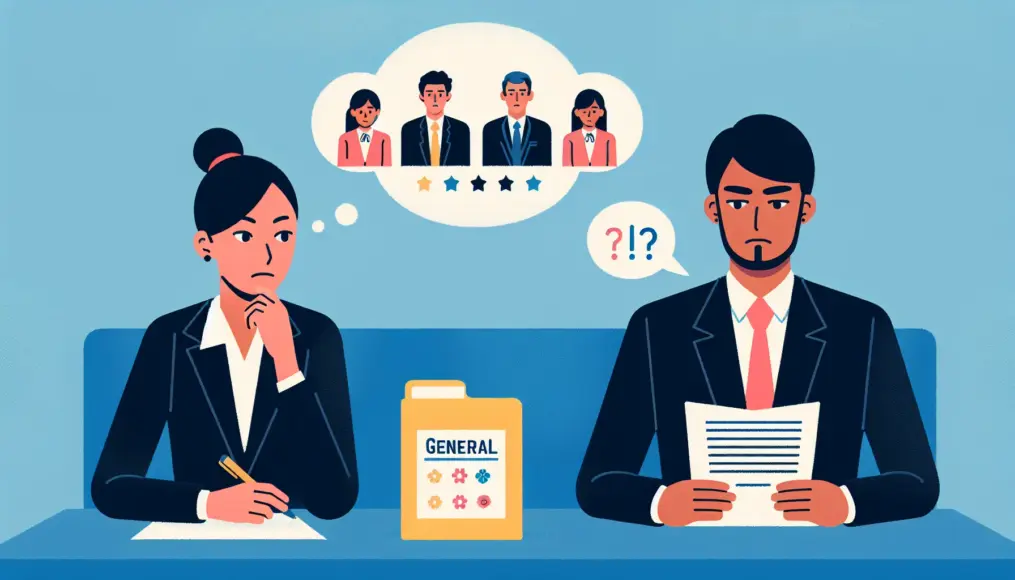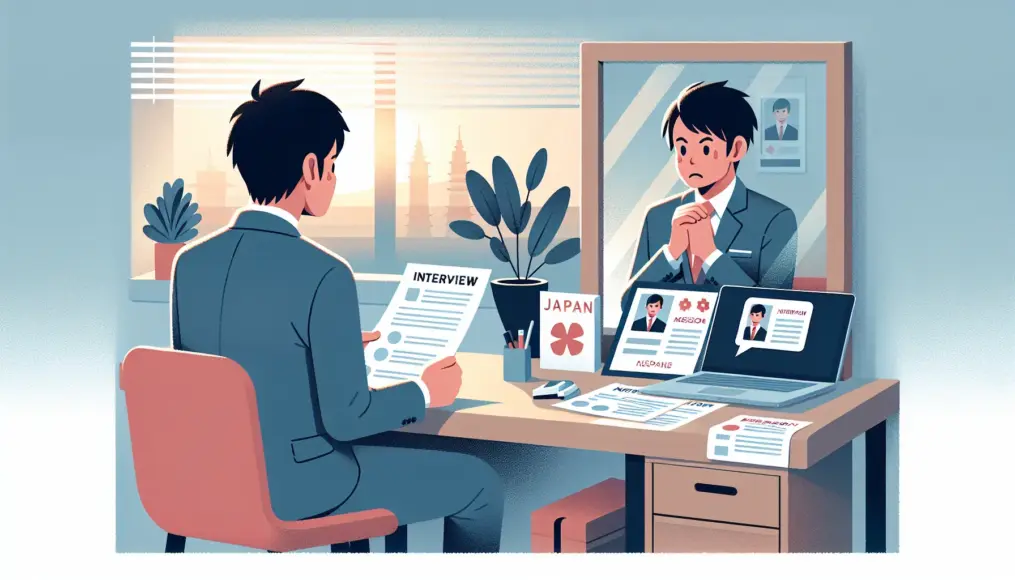When planning your future career, it’s essential to understand the types of questions that come up in general job interviews. These interviews are critical opportunities for you to showcase your strengths, but effective preparation is key to making a lasting impression. By familiarizing yourself with commonly asked questions and reflecting on your future aspirations, you can approach your interviews with greater confidence.
In this article, we’ll delve into the trends of questions typically asked in general job interviews and discuss the skills that will be in demand in the future. Taking the time to prepare for your interview not only helps you articulate your career vision but also guides you in choosing the ideal workplace. Let’s explore effective strategies for interview preparation with an eye toward your future career.
- We’ll introduce some of the fundamental questions frequently asked in general job interviews.
- We’ll examine why future-oriented questions are increasingly being emphasized.
- We’ll also discuss company culture and evaluation methods that can assist you in making informed workplace choices.
Common Interview Questions for General Positions
In interviews for general positions, a variety of questions are designed to help employers understand the candidate’s suitability and values. Familiarizing yourself with these questions in advance can boost your confidence when it’s time to respond. Basic questions and future-oriented inquiries are particularly crucial as they reveal whether your profile aligns with what the company is looking for.
Here, we’ll explore the types of questions frequently asked in general job interviews, categorizing them into basic and future-oriented questions. It’s essential to organize your experiences and thoughts to prepare thoroughly.
Basic Questions
Basic questions are typically asked in nearly every interview to assess the candidate’s background and motivation for applying. For instance, questions like “Can you introduce yourself?” or “Why do you want to work for this company?” are designed to see how candidates express themselves. For these types of questions, it’s important to communicate your strengths and values clearly.
These fundamental questions also play a role in gauging the candidate’s personality and fit within the company. By preparing adequately and incorporating specific examples into your responses, you’ll be able to provide answers that leave a lasting impression.
- Understand the basic questions commonly asked in general job interviews
- The importance of effectively conveying your self-introduction and motivation
- Tips for crafting responses that include specific examples
Future-Oriented Questions
Future-oriented questions are intended to evaluate whether candidates can contribute to the company in the long term. Typical questions include, “Where do you see yourself in five years?” and “What skills do you want to develop once you join?” It’s crucial to have a clear career plan and set goals when answering these questions.
Companies value how well candidates resonate with their vision and their potential for mutual growth. Therefore, when responding to future-oriented questions, it’s important to answer confidently while weaving in specific goals and plans.
- Understand why future-oriented questions are asked
- The importance of having a clear career plan and goals
- How to convey your enthusiasm for the company by sharing specific objectives
Skills Needed for the Future Workplace
As technology continues to evolve and work styles diversify, the skills required in the workplace are also changing. Particularly in general positions, adaptability and communication skills are becoming increasingly important. These abilities are essential for effective teamwork and flexible problem-solving. It’s common for interviewers to ask about these skills, making it crucial to understand them beforehand.
In this section, we’ll dive deeper into the adaptability and communication skills that will be especially sought after in the future workplace. By mastering these skills, you’ll be able to respond confidently during interviews and enhance your chances of thriving in your job.
The Importance of Adaptability
Adaptability is the ability to respond flexibly to changing environments. In today’s fast-paced business landscape, rapid changes are the norm. Therefore, individuals with high adaptability are incredibly valuable, as they can adjust their actions and thought processes to fit various situations. Many interviewers will ask questions like, “How did you adapt to a new environment?”—a great opportunity for you to reflect on your experiences.
Examples of demonstrating adaptability include your eagerness to learn new technologies or experiences where you overcame challenging situations. Clearly conveying these examples during an interview will make you an attractive candidate to potential employers.
- Adaptability is essential for responding flexibly to change.
- Interviewers often seek specific examples related to adaptability.
- A willingness to learn new technologies showcases adaptability.
Communication Skills
Communication skills are crucial for fostering smooth interpersonal relationships in the workplace. Good communication is indispensable for teamwork, information sharing, and problem-solving. Interviewers frequently ask, “How do you communicate with your team members?” It’s important to respond by incorporating your personal style and specific experiences.
Effective communication encompasses both listening and conveying information. Showing a willingness to listen to others’ opinions and finding ways to communicate clearly will leave a positive impression on your interviewer. By effectively highlighting these abilities, you can elevate your standing in the eyes of potential employers.
- Communication skills are key to smooth interpersonal relationships in the workplace.
- Interviewers look for concrete examples of your communication style.
- Possessing strong listening and conveying skills can create a favorable impression.
Crafting Your Career Vision for Interview Preparation
When preparing for a job interview, having a clear career vision is essential. Employers want to understand what future you envision for yourself and whether that vision aligns with the company’s goals. By articulating a well-thought-out career vision, you can speak confidently during the interview and demonstrate how you fit with the organization.
In this section, we’ll explore key points for self-analysis that will help you develop your career vision, along with practical steps for creating a career plan. By clarifying your desired direction, you’ll make your interview preparation more effective.
Key Points for Self-Analysis
Self-analysis is the first step in shaping your career vision. By understanding your strengths, weaknesses, interests, and values, you can gain clarity on the kind of workplace that suits you best. Reflecting on your past experiences—both successes and failures—is also crucial, as it helps you identify job roles and company cultures that align with your personality.
During the interview, sharing specific anecdotes from your self-analysis can add credibility to your narrative. Consider how you’ve grown over time and how that growth can be leveraged in your future career.
- Self-analysis is the foundational step in forming your career vision.
- Understanding your strengths and interests helps you choose the right workplace.
- Reflecting on past experiences and sharing related stories enhances your persuasiveness.
How to Develop a Career Plan
Creating a career plan is about mapping out a concrete path towards your future. Start by setting both short-term and long-term goals, then think about the steps you’ll need to take to achieve them. For instance, you might aim to acquire specific skills in the short term while aspiring to a management position in the long term.
While your career plan should be flexible, it’s important to maintain a clear direction. During interviews, be prepared to explain why you chose your particular plan and how it connects with your values. This will effectively communicate your enthusiasm and vision for the future to potential employers.
- A career plan begins with setting short-term and long-term goals.
- It’s important to have a clear direction while remaining flexible in your planning.
- Being able to explain how your values relate to your plan can help you impress employers.
Tips for Choosing a Better Workplace
Selecting the right workplace is crucial for your long-term career. The characteristics that companies seek in candidates and the atmosphere of the workplace can significantly impact your values and work style, so it’s essential to choose wisely. During interviews, it’s important not only to demonstrate how well you fit into the company but also to consider whether you can grow in that environment.
In this section, we’ll explore how to understand corporate culture and assess the workplace environment. Learn tips to find a workplace that suits you and make informed decisions for a better career.
Understanding Corporate Culture
Corporate culture reflects a company’s values and norms, shaping the workplace atmosphere and work style. To grasp a company’s culture during the interview, pay close attention to its vision, mission, and internal communication style. You can uncover what values the company prioritizes by asking the right questions.
It’s also vital to check if the company’s culture aligns with your own values. When what you care about aligns with what the company values, you’re more likely to find a comfortable work environment. Prepare questions related to corporate culture for your interview to ensure you get a clear understanding.
- Corporate culture affects the workplace atmosphere and work style.
- Observing the company’s vision and communication style is crucial.
- Confirming the alignment of your values with corporate culture contributes to a better work experience.
Assessing the Workplace Environment
To evaluate the workplace environment, visiting the actual office and hearing employee opinions can be very effective. If you can get a feel for the office atmosphere during your interview, it will help you understand the real work environment. Asking about employee work styles and benefits can provide insights into the company’s true nature.
Additionally, checking employee review sites and social media to see what current employees say is a great approach. Hearing from people who actually work there can give you a clearer picture of the company and help you determine if it’s the right fit for you.
Understanding corporate culture and the workplace environment are essential elements of choosing a better workplace. If you want to learn more about preparing questions for your interview, check out this article on “Mastering Interview Questions for Career Success!” for valuable tips on how to effectively respond to interviewers.
- Evaluate the workplace by visiting the office and listening to employee feedback.
- It’s important to assess the office atmosphere during the interview.
- Using review sites and social media to gather insights from other employees is beneficial.
Summary
When it comes to job interviews for general positions, it’s crucial for candidates to have a clear vision of their career goals and the criteria they use to choose a workplace. Interview questions can range from basic inquiries to forward-thinking ones, but with solid preparation, you can approach them with confidence. Understanding the company’s culture and work environment is also key to finding a workplace that suits you.
Through the process of preparing for interviews, it’s essential to engage in self-analysis and develop a career plan that highlights your strengths. This way, you can ensure a good fit with potential employers while making informed choices about your future workplace.
- Preparation for both basic and future-oriented questions is important.
- It’s necessary to clarify your career vision through self-analysis.
- Understanding company culture and work environments will help you choose the right workplace for you.
I hope this information proves helpful in your interview preparations. If you have any comments or questions, feel free to reach out!



Comment